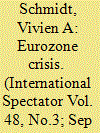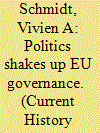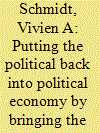|
|
|
Sort Order |
|
|
|
Items / Page
|
|
|
|
|
|
|
| Srl | Item |
| 1 |
ID:
126449


|
|
|
|
|
| Publication |
2013.
|
| Summary/Abstract |
The economic policies of the eurozone crisis, generally presented in apolitical terms, are political both in their underlying principles and in their effects. The EU's 'policy without politics', based on ordo-liberal ideas for macroeconomic austerity and neo-liberal ideas for structural reform, has left the member states with 'politics without policy', in which dissatisfied citizens have had little recourse. This has led to increasing political disaffection, polarisation, and Euroscepticism. Proposals to politicise so as to legitimise the EU by electing the Commission President hold some promise, in contrast to election of the Council President. But the danger, given the eurozone crisis, is that such elections will only politicise so as to delegitimise.
|
|
|
|
|
|
|
|
|
|
|
|
|
|
|
|
| 2 |
ID:
171098


|
|
|
|
|
| Summary/Abstract |
EU governance, which was long apolitical and technocratic, with disagreements handled in private and deals made behind closed doors, has become more politically charged.
|
|
|
|
|
|
|
|
|
|
|
|
|
|
|
|
| 3 |
ID:
088899


|
|
|
|
|
| Publication |
2009.
|
| Summary/Abstract |
Dominant theoretical approaches in political economy today, whether they posit convergence to neoliberal capitalism, binary divergence of capitalisms, or tripartite differentiation of financial governance, downplay the importance of state action. Their methodological approaches, rational choice and historical institutionalism, tend to reinforce their substantive theories either by disaggregating the state into its historical institutional components or by focusing on the strategic actions of its rational actors. This article argues that by not taking state action seriously, they are unable to explain the differences in degree and kind of countries' neoliberal reforms. For this, it is necessary to bring the state back in and to put the political back into political economy not just in terms of political economic institutions but also in terms of policies, polity, and politics. To explore the political in all its variety, however, the article demonstrates that at least one more methodological approach, discursive institutionalism, is also needed. This approach, by taking the role of ideas and discourse seriously, brings political actors as sentient beings back in. This in turn also enables the author to explain the dynamics of neoliberal reform in political economy.
|
|
|
|
|
|
|
|
|
|
|
|
|
|
|
|
|
|
|
|
|